Northrup Grumman-Huntsville awarded contract to modules for Navy ships
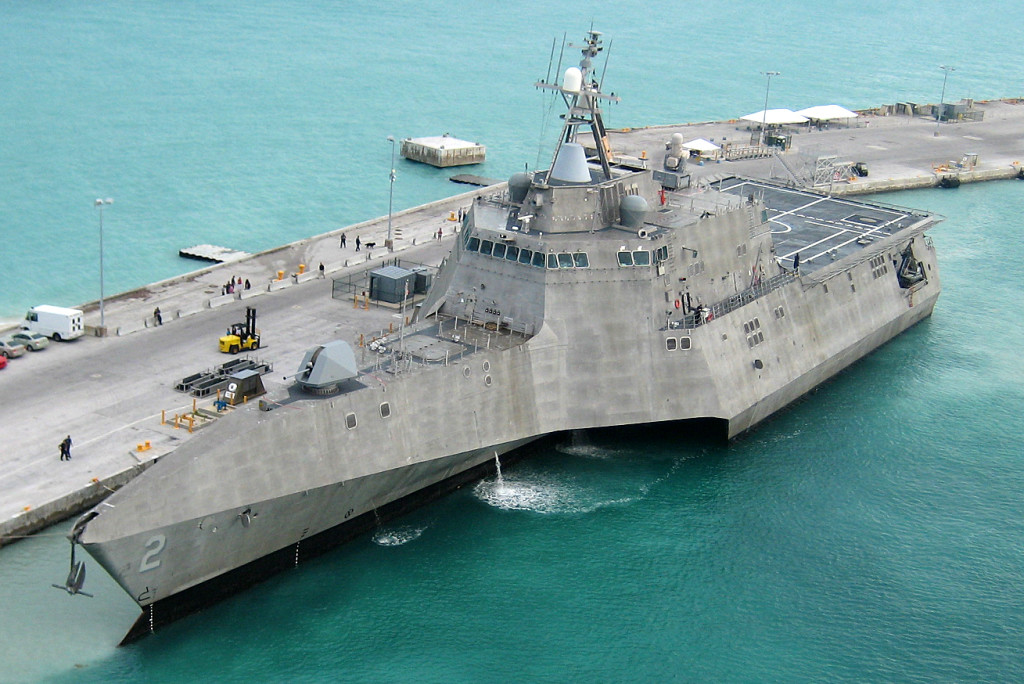
Northrop Grumman has been award a contract from the U.S. Navy for gun mission modules on Littoral Combat Ships (LCS). The Department of Defense (DoD) announced the deal Monday. According to the DoD, 91% of the work will be performed in Huntsville, Ala. and is expected to be completed by December 2019. The deal is valued at more than $7,420,308 million under the terms of a firm-fixed-price contract, a modification to a previous award. “Exciting news! Northrup Grumman in Huntsville was just awarded a contract to build gun mission modules for Littoral Combat Ships. Proud to see the whole state of Alabama working together to build these capable and efficient naval ships,” said Alabama 1st District U.S. Rep. Bradley Byrne.
Bradley Byrne: Two big things you may have missed
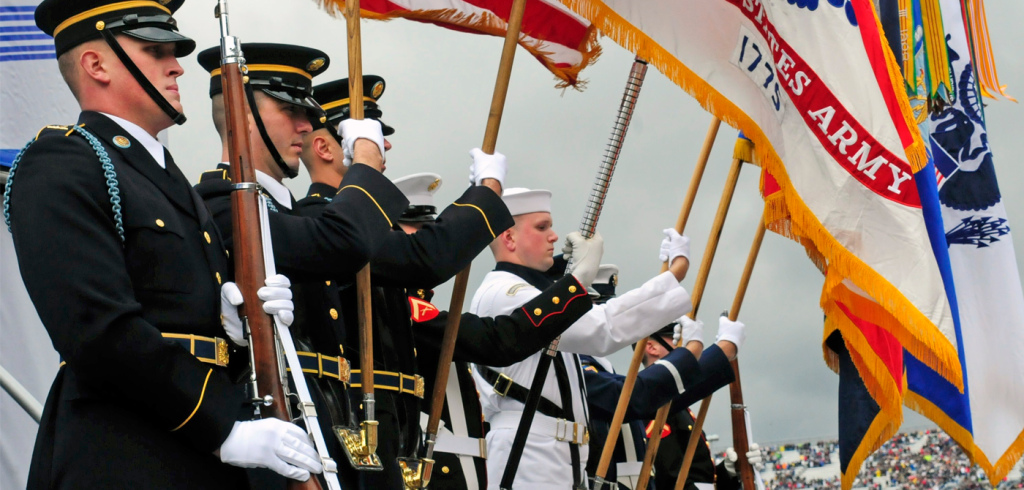
I understand why people are so frustrated with politics these days. The American people want action, and it may not seem like much is actually getting accomplished. I share those concerns, but my frustration is not connected to my work in the House of Representatives. Despite the media’s infatuation with relitigating the 2016 election, there are very substantive bills that pass out of the House almost every week. In fact, two very important bills passed out of the House the week before Thanksgiving, and the national news media did not give either the attention they deserved. I want to quickly bring you up to speed. First, the House passed the National Defense Authorization Act (NDAA) by a strong bipartisan vote of 356 to 70. The same bill then passed out of the Senate on a unanimous voice vote. As some of you may remember, the NDAA is the bill Congress must pass each year to set policy and authorize funding for the entire U.S. military. It almost always earns bipartisan support because, believe it or not, there is strong bipartisan support in Congress for a strong national defense. This year’s NDAA makes important progress toward rebuilding our military by calling for more service members, better equipment, and additional resources. The bill also authorizes the largest pay raise for our troops in eight years and includes a number of important provisions related to our nuclear weapon program in light of continued threats from North Korea The NDAA is important to Southwest Alabama because it authorizes the construction of three additional Littoral Combat Ships (LCS). These are the Navy ships that are built by Austal USA in Mobile. I pushed hard to ensure adequate support for the LCS program in an effort to make our Navy stronger and to protect thousands of jobs at the Mobile shipyard. Second, on November 16th, the House passed landmark tax reform legislation that will cut taxes and help grow the American economy. The bill, known as the Tax Cuts and Jobs Act, is a key part of President Donald Trump’s agenda. The benefits of this bill aren’t abstract. Just consider the median family of four in Southwest Alabama. That family earns a little over $77,000 a year. If that family takes the standard deduction, as most do, they will see a tax cut of $1,739.16. That comes out to almost $150 extra dollars a month. That’s just as it relates to the individual tax code. When you add in additional reforms to the business and corporate code, studies have shown that the American economy will really take off, resulting in more jobs and higher wages. President Trump has predicted a “Middle Class Miracle.” These are just two of the most recent examples of the over 350 bills that have passed out of the House this year. The vast majority of those bills passed with bipartisan support, much like the NDAA. Despite roadblocks in the Senate, the House is doing our job and actively working to follow through on the agenda we all ran on in 2016. If you have a hard time cutting through the noise of the national news media, I invite you to sign up for my weekly e-newsletter to help keep up with what is happening in Washington and how it impacts Southwest Alabama. You can sign up online at Byrne.House.Gov. At the end of the day, I am going to keep doing the job you elected me to do: fighting each and every day for our shared values and for the hardworking people in Mobile, Baldwin, Clarke, Monroe, Escambia, and Washington counties. • • • Bradley Byrne is a member of U.S. Congress representing Alabama’s 1st Congressional District.
Austal USA lands US Navy contract to build additional ship in Mobile
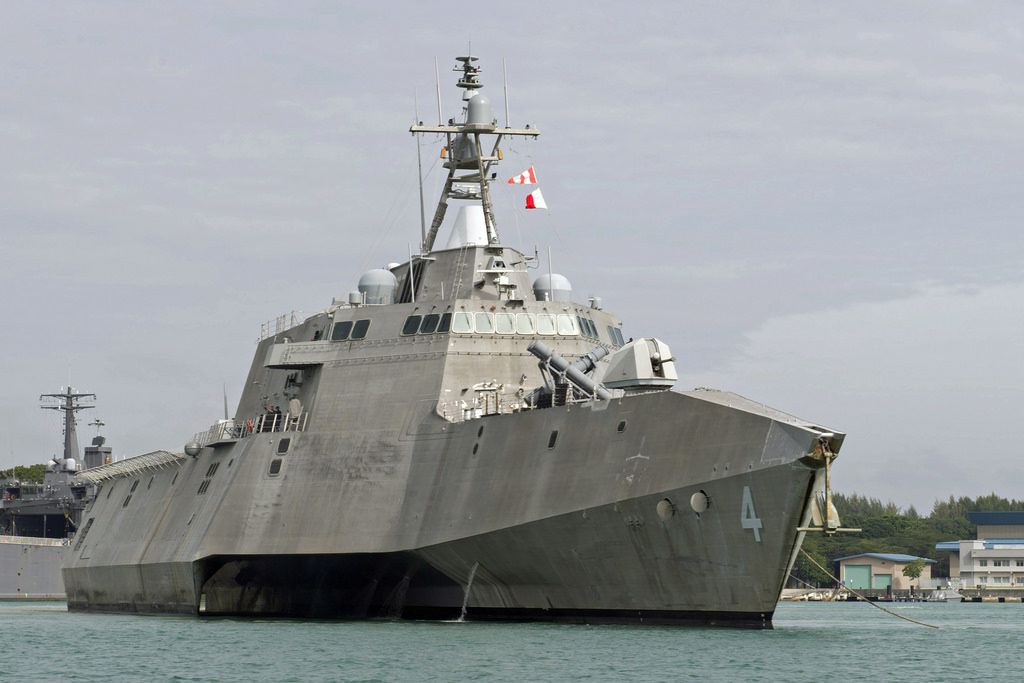
Austal USA has been awarded a construction contract to build an additional Independence-variant Littoral Combat Ship, its fifteenth ship in the class, for the U.S. Navy. The contract is an economic boon for the Yellowhammer State as Austal USA will build the ship at its Mobile, Ala. headquarters and manufacturing facility, which employs 4,000 people and includes a supplier network of over 2,200 businesses across 43 states. “When Alabama’s businesses succeed, Alabamians succeed,” said Gov. Kay Ivey of the newly awarded contract. “Austal USA is a 21st-Century, technology-driven, employer which provides good wages and good opportunities for its employees. Austal is critical to our state’s high-tech military and aerospace manufacturing sector. Ivey continued, “By adding to its ship order, the U.S. Navy is signaling its confidence in Austal’s products and the employees who build it. Alabama has a skilled workforce that is known for producing high-quality goods. I look forward to more announcements like this one from Austral, as well as other companies that do business in Alabama, because of our trained workforce and our positive business environment.” Austal would not reveal the value of the contract, but confirmed the value is under the congressional cost cap of $584 million per ship. “We’re honored to be awarded this contract in such a highly competitive environment,” said Austal USA President Craig Perciavalle. “This further supports the Navy’s recognition of Austal as a key component in building their 355-ship fleet, which is a testament to the hard work and commitment of our talented employees and dedicated supplier network.” The littoral combat ship has been identified as a key component to the Navy’s ability to gain sea control through distributed lethality. Austal is the fifth largest shipbuilder in the United States
U.S. Navy’s next Littoral Combat Ship to be named USS Mobile
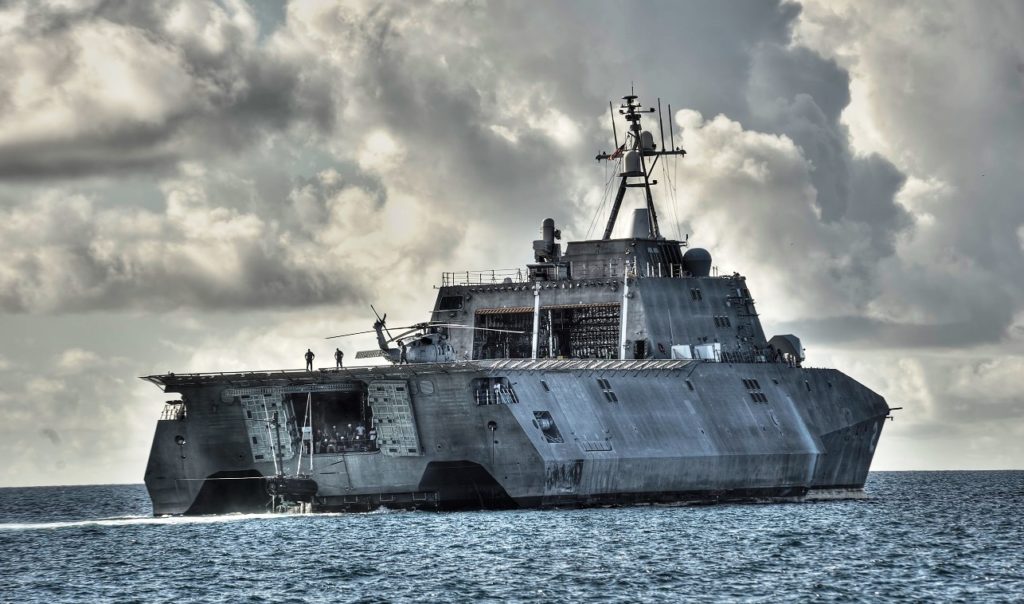
Secretary of the U.S. Navy Ray Mabus announced on Thursday, the next Independence-variant Littoral Combat Ship (LCS) will be named USS Mobile (LCS 26) to recognize the Alabama city’s significant contribution to Navy ship building. “I can’t think of a better way to recognize the superior craft and workmanship Mobilians put into each of these ships,” Mobile Mayor Sandy Stimpson said. “A little piece of Mobile goes into each of the Independence Class LCS ships made right here at Austal, but this ship is especially significant because it marks us as a regionally important U.S. city with global impact and magnificent workers. I have no doubt Austal will produce another incredible warship worthy of the name Mobile that will not only meet the standards of today but will adapt to the evolving needs of the future. “ Stimpson sent a letter to Mabus last year requesting the Navy consider naming a future LCS the USS Mobile as a tribute to the City of Mobile and its citizens “who put their heart and soul into every warship they build.” Alabama 1st District U.S. Bradley Byrne was present for the announcement ceremony Thursday in Washington, D.C.. “Our area takes such pride in building these fine ships, just the latest vessel in Mobile’s long history of shipbuilding,” said Byrne. “I know the spirit and patriotism of Mobile will be encapsulated in this ship.” Byrne continued, “I appreciate Secretary of the Navy Ray Mabus for working with us to make this possible, and I look forward to one day standing in the Mobile waterfront to christen and commission this fine ship.”
Ronda Walker: Celebrating the Alabama-built USS Montgomery
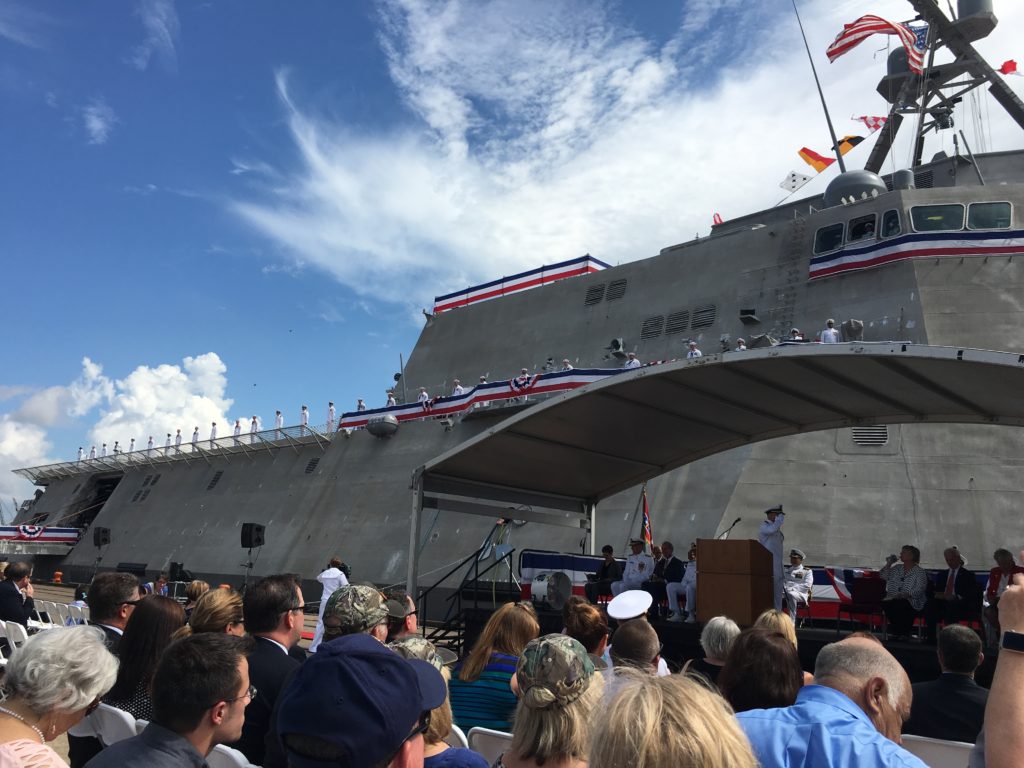
In the fall of 2011, Secretary of the United States Navy Ray Mabus visited Montgomery and participated in a ceremony on the banks of the Alabama River to announce that one of the new Littoral Combat Ships (LCS) built by global shipbuilder Austal, would be named after the City of Montgomery. Five years later, on Sept. 10, the United States Ship Montgomery was commissioned in a grand ceremony in Mobile. It was a sunny Saturday morning as my husband, Jason, and two of our children, Eli and Margaret, approached the Alabama State Docks in Mobile. As the USS Montgomery came into view, pride and awe filled our hearts. The Montgomery is a strong and aggressive state-of-the-art naval combatant, and with all of her strength and might she protects our borders. She is a bold new addition to the Navy’s combat mission and she was built in Alabama. Adjusting to advances in technology and combat strategy, the Navy determined to improve force coverage in the immediate littoral waters, the waters closest to the shore, thus the development of the Littoral Combat Ship. The LCS is known for her speed, maneuverability and flexibility. She can swap out various systems to take on different missions, including finding and destroying mines, hunting submarines in shallow water, and fighting small boats. She also boasts a large flight deck and hangar. The U.S.S. Montgomery can reach a max speed of 40-plus knots, weighs 2,959 tons, and is 420 feet long. On board she will have 11 officers and 42 enlisted personnel. She will leave Mobile Bay this week headed to San Diego, passing through the Panama Canal en route. On board she will have the ship’s bell from the previous USS Montgomery (C9). That bell will eventually find its way back to the City of Montgomery and be displayed in City Hall for visitors to enjoy. About 3,000 people gathered for the commissioning ceremony last Saturday. Many Montgomerians made the trip as well as many from our sister city of Mobile, including Mayor Sandy Stimpson. Crew members of the USS Montgomery had family in attendance, and there were dignitaries from across the state including Lt. Gov. Kay Ivey, Sen. Jeff Sessions, Congressman Bradley Byrne, Montgomery Mayor Todd Strange, and Montgomery County Commission Chairman Elton Dean. But for the most part the crowd consisted of proud Alabamians excited to experience this awesome piece of history. Naval tradition calls for each ship to have a sponsor, a female civilian who will provide good luck and advocacy for the ship. In the case of the USS Montgomery, the grand honor of sponsor was bestowed on a Montgomery native daughter, Mary Montgomery Blackshear Sessions. Mrs. Sessions grew up in Montgomery and attended Huntington College, where she met her husband, U.S. Sen. Jeff Sessions. Mary Sessions brought a remarkable amount of Southern charm, grace and strength to the commissioning ceremony as she served in her capacity as sponsor. Mrs. Sessions is now considered a permanent member of the ship’s crew. For most in attendance, like myself, witnessing the birth of a new naval ship was a first-time experience. It was a profound moment for my entire family that will forever be etched in our memory. After the impressive pomp and circumstance of the ceremonial speeches and bell ringing, the Commander of the USS Montgomery, Daniel Straub, called out for his sailors to, “man our ship and bring her to life.” At that moment as the brass band played, the uniformed crew of the Montgomery ran from the back of the audience, down the aisles and up the plank of the massive ship, literally bringing her to life. Because as powerful and grand as the ship itself is, the lifeblood of the Navy is the men and women who serve. I was overcome with tears of patriotic pride as the sailors boarded their ship and prepared to serve and defend our great nation. Words cannot express my thankfulness for the service of all of our military members. I cannot think of a more fitting event to attend with my family one day before the 15th anniversary of 9-11-01. The moment was not lost on anyone in attendance as we remembered the painful images of the 9-11 attacks and now sat staring at the newest vessel in the world’s most powerful Navy. We are a stronger, more prepared people as a result of our collective experiences and the powerful display of military might realized in the USS Montgomery made us all proud to be Americans. We must stand firm in our commitment to provide for a common defense. Thank you USS Montgomery, I wish you fair winds and following seas. ••• Ronda M. Walker is a wife, mother of four, and a member of the Montgomery County Commission.
Bradley Byrne: Reflections on China

China is the largest country in the world with a population of approximately 1.4 billion people, and I recently had the opportunity to travel there with some of my congressional colleagues. I want to share a few of my takeaways with you. We must realize that the key to a successful relationship with China is the proper mix of cooperation and a firm assertion of America’s priorities. This mix is particularly important in matters of the economy and trade, as well as with security issues. The United States and China are now the number one and number two countries in the world economically. Over the last 20 years, the Chinese economy has grown at a rate over 10%. Even in the recent economic slowdown, they have seen growth of nearly 7%. Our two countries are competitors, and at the same time, beneficiaries when it comes to trade. We are China’s number one export market while China is a major importer of U.S. goods and services. As more people in China enter the middle class, demand will increase for higher-end products that the United States can and does provide. In addition, we receive more affordable consumer goods from China, which helps keep inflation low. We have a number of local ties to China. China depends on the United States for a number of agricultural imports, and many of those products are produced at Alabama farms. Also, Continental Motors, which has an operation at Brookley Aeroplex in Mobile, is a U.S. subsidiary of a Chinese company, and they employ several hundred people right in our backyard. Unfortunately, the Chinese have shown they will do anything to win, including spying and cheating. China has a track record of being a bad actor when it comes to trade, especially as it relates to currency manipulation and dumping products into the international market. These issues are especially harmful to the steel industry, which is important to our local economy in Southwest Alabama. We must have a more aggressive and pro-American strategy to address these issues relating to trade and the economy. At the end of the day, no trade is preferable to unfair trade that negatively impacts American workers. The relationship with China is also important from a security standpoint. Over the last decade, China has significantly expanded its military capabilities, and this is going to only increase as time goes on. China is a nuclear country, and it is becoming a more traditional military force, especially when it comes to its navy, air force, and missile capability. One of the reasons I have pushed so hard for the United States to expand our own naval fleet, including the Mobile-built Littoral Combat Ship, is that we must project American force in the western Pacific in response to Chinese naval, air, and missile build-up. Over five trillion dollars in goods move through sea lanes in the South China Sea, and now China is trying to exert control over the region by claiming islands that are also claimed by other nations. While the sovereignty and ownership is being decided in international tribunals, we cannot let China simply exert rights and control over this important area. Clarity and predictability in our policy and our rules of engagement are critical when it comes to interacting with the Chinese in this important maritime environment. On the other hand, China can prove to be an important ally in both the fight against terrorism and in blocking North Korea’s threats to use nuclear and other weapons against South Korea, Japan, and even the western part of the United States. Ultimately, the key to the relationship between our two countries is balance. The United States must continue to engage with the nation and search for areas where we can work together, but we should always stand our ground when it is in our best interest. • • • Bradley Byrne is a member of U.S. Congress representing Alabama’s 1st Congressional District.
Bradley Byrne: Defense bill blocks attempt to cut Mobile shipyard
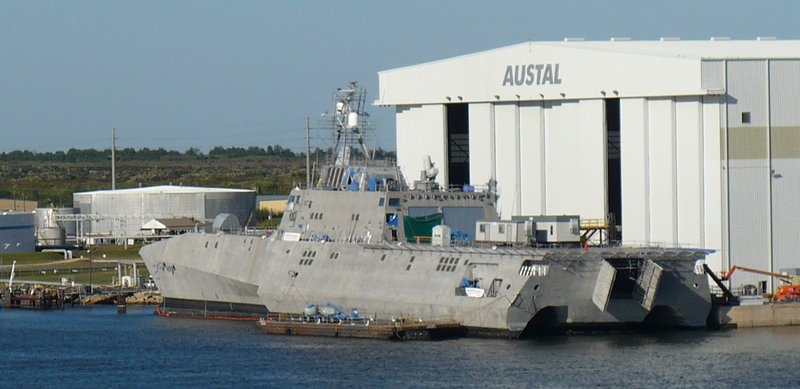
Southwest Alabama has a proud military tradition. Our area is home to a large number of veterans. The Coast Guard has a strong presence here. Important military vessels are constructed up and down the Gulf Coast. These are all things we take great pride in. That’s why it was so frustrating last December when Secretary of Defense Ash Carter announced his plans to cut the Littoral Combat Ship (LCS) program from 52 total ships to just 40. The LCS is the Navy vessel built at Austal USA in Mobile. Over 4,000 men and women are directly employed by the shipyard. Two different versions of the LCS are currently built by Austal in Mobile and Marinette Marine in Wisconsin. The Secretary also proposed eliminating one of the versions entirely in a “downselect” to a single builder. Navy officials testified before Congress that this would result in one of the shipyards closing entirely. I immediately went to work to make sure his efforts would not be successful. When the President’s budget was released and included the proposed cuts, I doubled down in my efforts. Ultimately, it is the decision of Congress, not a lame-duck President and a lame-duck Secretary of Defense. Let me be clear up front: I don’t support the LCS program simply because it is built in our area. I support the program because the Navy has made clear time and time again they like the LCS, and they need the ship in order to fulfill their mission. If these ships weren’t critical to the Navy, then I wouldn’t have a leg to stand on. So, I set out to stop these proposed cuts. In Congress, I serve on the House Armed Services Committee, which has jurisdiction over our nation’s entire military. Each year, the Committee must pass legislation known as the National Defense Authorization Act (NDAA). This is the bill that sets policy and authorizes funding for military operations and programs. As part of his efforts to cut the program, President Obama’s budget only requested funding for two Littoral Combat Ships this year, instead of the required three ships. My goal was [to] make sure the NDAA included full funding for three ships while also stopping the cuts from moving forward. I’m pleased to report that our efforts were successful, and the NDAA includes funding for three ships. I also introduced an amendment to prevent the Pentagon from following through with their plans to eliminate one of the two builders. My amendment was adopted without any opposition. Ultimately, the NDAA passed the full Armed Services Committee early Thursday morning after more than fifteen hours of debate. In a sign of the truly bipartisan nature of our committee, the bill passed by a vote of 60 to 2. This was a resounding victory for all the men and women who work at the Austal shipyard in Mobile. This means both Republicans and Democrats agree that President Obama is wrong for trying to cut the LCS program, which is so important to the Navy. More challenges may arise, but I promise to keep fighting for the LCS, the Navy, and the people who work at that shipyard. Most importantly, I promise to keep fighting for Southwest Alabama and our proud military traditions. • • • Bradley Byrne is a member of U.S. Congress representing Alabama’s 1st Congressional District.
Bradley Byrne fights efforts to cut shipbuilding program with Alabama ties

Congressman Bradley Byrne joined 45 other members of Congress in fighting back against an effort by the Obama administration to cut the Littoral Combat Ship (LCS) program, which has a significant presence in South Alabama through Austal USA. Austal, which recently won an award for large Alabama manufacturer of the year, employs more than 4,000 to build and deliver twenty ships to the U.S. Navy, with four more currently in production. Last year Defense Secretary Ashton Carter sent a memo to the U.S. Navy ordering the branch to decrease its LCS and frigate buy by 12 ships. According to a budget request submitted in February, the U.S. Navy complied with the request, cutting purchases of LCS from 52 to 40 vessels over the next five years. “The LCS program is critical to the future of the Navy, and I am pleased to have so many of my colleagues join me in fighting back against these proposed cuts,” said Byrne in a press release Tuesday. “The LCS program has been studied time and time again, and each time it becomes even more clear that we need 52 of these ships in order to properly defend our nation and keep sea lanes around the world open for commerce. I will continue working every day to protect the LCS program and the men and women who serve in the U.S. Navy.” The letter was signed by a wide range of lawmakers, including all seven of Alabama’s congressional delegation as well as congressmen and women from 19 states, including 32 Republicans and 14 Democrats. Sent to the leadership of the House Armed Services Committee, the letter urges the committee to reject the administration’s request. “This budget proposal comes from a President and Secretary of Defense who have less than a year remaining in office,” the letter states. “It defies logic to make significant changes to a program that was thoroughly studied and evaluated less than two years ago.” The House Armed Services Committee will begin consideration of the 2017 National Defense Authorization Act (NDAA) this week.
Navy ship christened in Alabama for former Arizona Rep. Gabrielle Giffords
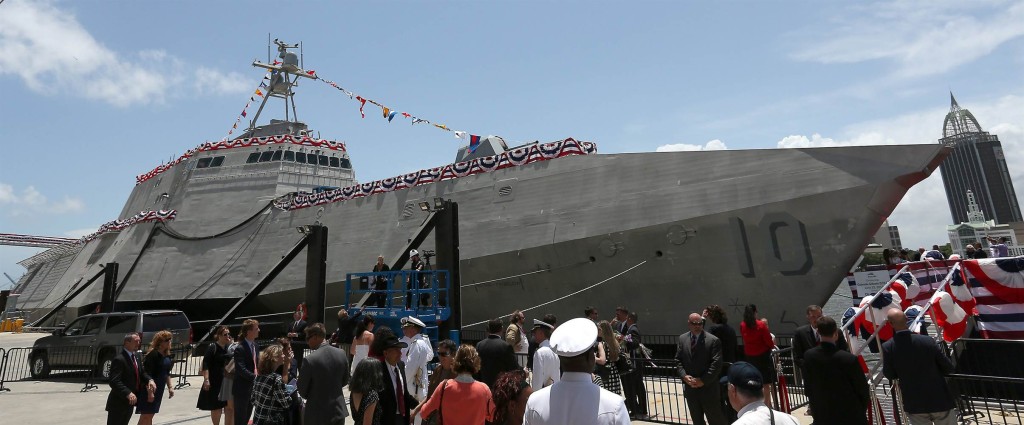
Former U.S. Rep. Gabrielle “Gabby” Giffords of Arizona had a Navy vessel named in her honor during a ceremony at a Mobile, Alabama, shipyard Saturday afternoon. Giffords joined others including Jill Biden, wife of Vice President Joe Biden, as the USS Gabrielle Giffords was christened in coastal Alabama. The 419-foot ship was built at the Austal shipyard and is the Navy’s 10th littoral combat ship designed to operate in shallow waters near the coast. Giffords was badly wounded in a 2011 shooting that left six dead and 13 injured in Tucson. The Democrat left Congress and later founded an organization that supports gun control. “In congress I was proud to support our armed forces. I love the Navy — I even married a sailor,” Giffords said as she kissed her husband Mark Kelly, a retired Navy captain and astronaut who stood by as she addressed the crowd. “Thank you to all who built this ship. She’s stealthy; she will defend freedom around the world.” Giffords was chosen as the vessel’s namesake because of the characteristics she exemplified after the attack, officials said. “Courage comes in many, many forms — physical, mental, spiritual and political. Gabby has truly modeled courage and resilience,” said Vice Admiral Philip Cullom, deputy chief of Naval operations for fleet readiness and logistics. Biden was the ship’s sponsor and Cullom said her spirit will guide the vessel while it is in service. Biden called the ship a feat of engineering excellence. During his speech, Kelly paused to thank Biden for attending the ceremony as she mourns the death of her stepson former Delaware Attorney General Beau Biden. Biden, a Delaware National Guard major who spent a year in Iraq and was awarded a Bronze Star, died May 30 after a two-year battle with brain cancer. “Know that Beau was the kind of person that made us all deeply hopeful for our country’s future. He did that for Gabby and for me,” Kelly said. “As a military mom, there is no one I would rather be with than you here today, the ones who stepped up to serve,” Biden said, also adding, “Gabby represents the same qualities the Navy embodies.” Republished with permission of the Associated Press.
Bradley Byrne: National defense bill includes critical reforms

There is no function of Congress more important than “providing for the common defense” of our nation. When our Founding Fathers wrote the Constitution, they made sure to give the Congress substantial influence over the military. Each year, Congress exerts some of that authority in a bill known as the National Defense Authorization Act (NDAA). This bill lays out the policy and priorities for the Pentagon while also authorizing construction of military equipment and vessels. The NDAA does not actually provide funding, as that is done in a separate defense funding bill. The NDAA has long been a bill that earns support from both sides of the aisle. Even in today’s era of hyper-partisanship, the NDAA has remained a shining example of bipartisanship. While there will almost always be some differences in opinion, we generally all agree on the importance of supporting our nation’s military. As a member of the House Armed Services Committee, I have the opportunity to play a key role in the drafting and passage of the NDAA. Just last week, the Committee held an almost nineteen hour markup on the latest version of the NDAA. I wanted to highlight some of the important provisions in this year’s bill. First, the bill authorizes the construction of three more Littoral Combat Ships (LCS), which are built in part by Austal USA in Mobile. Our military commanders have made clear that the LCS is an important component of the naval fleet, and it fills a critical void in the Navy’s capabilities. I will continue to support this program and the over 4,000 men and women who work at the shipyard. Next, the NDAA makes some much-needed reforms to the Department’s acquisition process in order to make it less burdensome while still maintaining accountability. The Pentagon currently spends too much time filling out paperwork and going through a bureaucratic process while preparing to acquire new equipment. The NDAA makes reforms that will help streamline that process. Like any government agency, the Department of Defense should constantly be searching for ways to become more efficient and effective. That’s why the NDAA cuts some of the fat at the Pentagon and ensures money is actually going to our service members. The bill eliminates over 460 mandated reports and calls for a reduction in the Pentagon’s headquarter personnel. It is more important now than ever before that we are recruiting and retaining the best and the brightest to serve in our military. In that regard, the NDAA calls for a 2.3% pay raise for active duty military. The NDAA also lays the foundation for reforming the military compensation system – by providing additional options to individuals who serve the nation for a period of less than 20 years – while rejecting the President’s efforts to raise healthcare costs for military personnel. The NDAA also includes provisions related to the ongoing conflicts around the globe. The bill reinforces the mission of the United States against the Islamic State of Iraq and the Levant (ISIL) while also calling on the United States to provide defensive lethal aid to Ukraine in their fight against Russian-backed separatists. Just as important, the bill would prohibit President Obama from closing Guantanamo Bay in Cuba. These are just a few of the important reforms included in this year’s bill. Ultimately, the Committee passed the NDAA at around 5:00 a.m. last Wednesday morning by a bipartisan vote of 60 to 2. The full House is expected to take the bill up the week of May 11. It is my sincere hope that we never lose focus on ensuring our sailors, soldiers, airmen, and Marines have the resources they need to defend our country. A capable military is a fundamental requirement for a vibrant democracy, and I will do everything I can to ensure our military remains strong. Bradley Byrne is a Member of the United States Congress representing Alabama’s 1st Congressional District. Photo Credit: AP file photo


